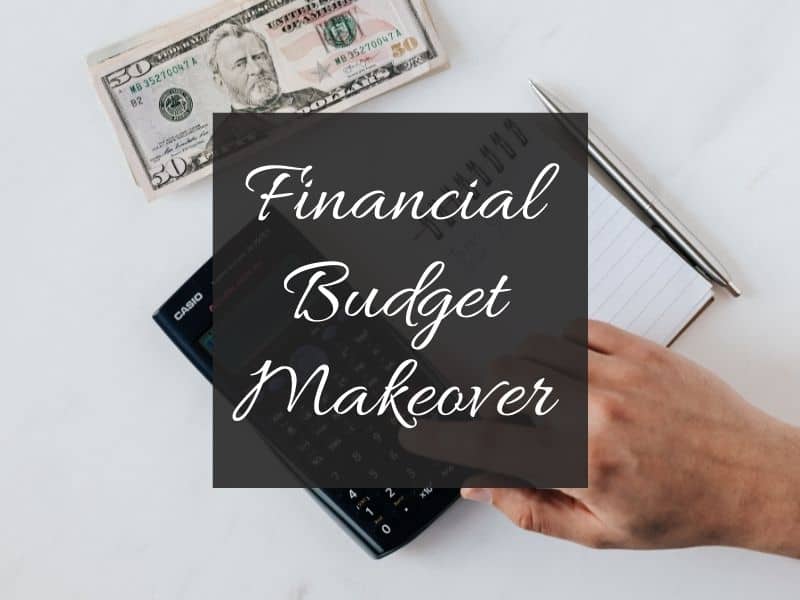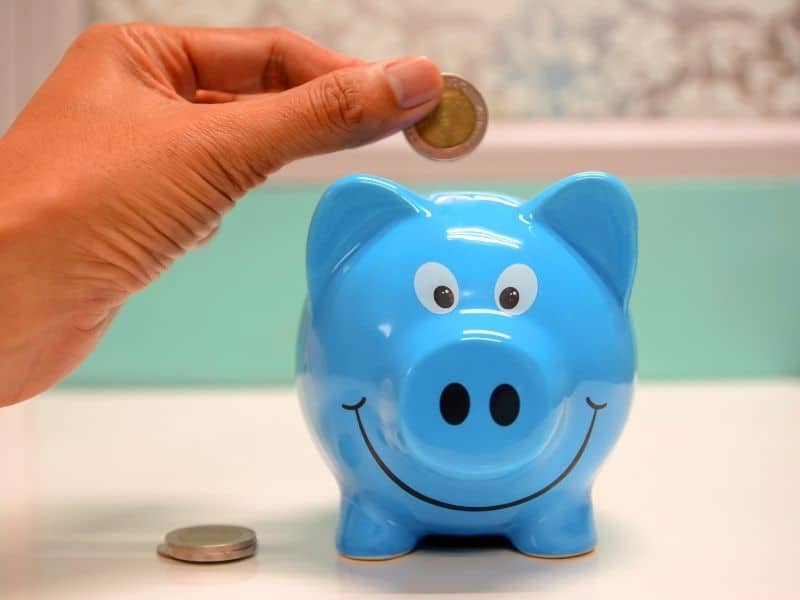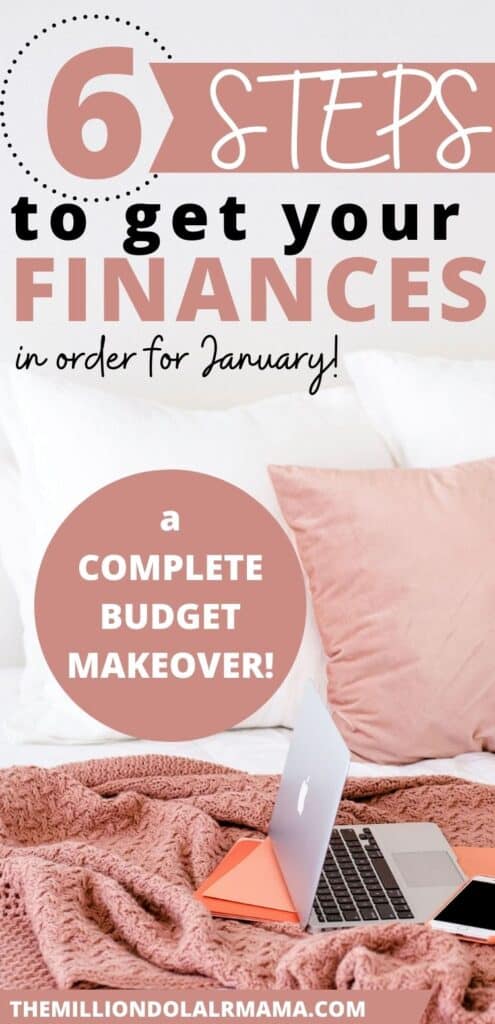The New Year is the perfect time to makeover your financial budget. A new year is like a fresh start and gives us the opportunity to dive into our finances and get that budget tweaked and ready to roll for the new year!
It also helps us start to create a strategic financial plan for the future so we can get our finances under control.

Budgets can be like New Year’s Resolutions – we start them with the best of intentions but after a few months they kind of fall to the wayside and we cross our fingers and pray that nobody asks how we’re progressing.
But the unfortunate fact is, putting your head in the sand and ignoring your budget (or lack thereof) won’t make your financial woes disappear. How to get through financial hardships.
For many people, it sounds incredibly restrictive to be “tied down” to a budget. I completely get that. And based on your personal financial situation, you may need to set a more restrictive budget at least for the short-term.
But those short-term restrictions will provide a much larger payoff (literally and figuratively.)
Instead of focusing on how restrictive having to stick to a budget might feel, try to imagine how freeing it will feel when you don’t have to be a slave to your debt.
When you’re not having to feel guilty about swiping your credit card to pay for a new pair of shoes, because you have the extra cash to pay for them.
Remember, short term pain for long term gain (these financial affirmations will help you stay on track)! If you start now, focus, and get serious about organizing your finances and getting your budget in order, in the future, you might not even need a budget (although you may still want one!)
Read this post on an example of a cash budget to get started.
And if you’re not a fan of spreadsheets, try one of these budget planners – don’t make the vehicle for budget planning an excuse not to do it!
Read more about these personal budget categories!
How to Make A Budget
These steps will help you either make a new monthly financial budget, or makeover your current budget so it can provide you the best results possible. You may also want to use paycheck budgeting if you get paid more than once a month.
Read these awesome books about budgeting whether you’re a beginner or looking to up your game!
1. Figure out your exact income
The first step in making over your budget is figuring out exactly how much money you have coming in each month. If you’re a salaried employee, this is easy. However, if you’re a freelancer or an hourly employee things can be a bit trickier.
I would suggest looking at your last 6-12 months of income and working out the average. And remember, income isn’t just the money you earn from your job. Any sources of income count, including money from side hustles, interest or dividend income, real estate income, or any other passive income you may have coming in.
Once you have the last 6 or 12 months added up, divide it to come up with your average monthly income.

2. Sort your expenses into fixed, flexible and periodic
Expenses fall into three categories.
- Fixed expenses are the expenses that occur every month, and stay the same. Examples of fixed expenses are mortgage payments, rent, vehicle repayments, deposits into a savings account, cable bills, student loan repayments, etc.
- Flexible expenses are expenses that can change from month to month. These include groceries, gas, clothing, utilities, entertainment, etc.
- Periodic expenses are expenses that do not occur every month. Some examples of periodic expenses include taxes, birthday and Christmas gifts, vacations, property insurance. Periodic expenses can be either fixed or flexible.
If you use a debit or credit card to pay for things, it should be pretty easy to determine where your money is going. If you’re using cash, you’ll need to look at how much cash you are taking out and estimate what category it likely went to.
You’ll want to learn how to organize your monthly bills to make it easier to categorize these expenses.
3. Figure out exactly how much you spend
Once you’ve determined what your fixed, flexible and periodic expenses are, you need to get a handle on exactly how much you spend.
Once your categories are set up, look at what you have spent in each category for the last 6-12 months. Take the average for each category and put it in your budget. This is how much you spend each month in each category.
A great way to easily track what you spend (and make) is to sign up for FREE with Personal Capital. Personal Capital has a great Cash Flow Analyzer that will allow you to see exactly where your money is going.
And let me tell you, you will be surprised by the results. You probably spend WAAAAY more money than you think you do. That was definitely my experience the first time I started looking at exactly what I spend.
You will likely want to implement some of these frugal tips and take steps to learn how to live cheap.
In addition to tracking your expenses, Personal Capital is an awesome way to track your net worth so you can watch it increase as you start reducing expenses and debt, and doing things to increase your income.
You can also use an app like Mint or Quicken or one of these budget apps for couples.
4. Control your debt
If you plan on improving your finances, getting control of your debt is imperative. And even if it seems overwhelming, I promise you can do it one step at a time.
Work out what you owe, who you owe it to and what the current interest rate is on all your debt. Then construct a plan to pay it off as soon as possible.
Try to commit to making extra repayments on the debt that has the highest interest rate – the sooner you pay it off, the more money you’ll be able to put towards the remaining debt until you have no debt left!! This is called the snowball effect.
Follow these steps by Dave Ramsey to get debt paid off and create an emergency fund.
Credit cards and payday loans almost always carry the highest interest rates, so it’s a good idea to start with them.
One of the best ways to help control your debt is to make extra money to pay it off.
Probably the easiest way I make extra money is by using Ibotta and Ebates.
Ibotta is a free app that gives you cash back on a huge variety of groceries. It’s super easy to use (just scan the product barcode & snap a picture of your receipt – that’s it!) and a great way to earn some extra cash with very little work involved.
Ebates partners with hundreds of retailers to give you cash back on a percentage of your purchase. Basically, instead of going to the retailers website directly, first you go to Ebates. Then you’ll find the retailer you’re wanting to shop at from the alphabetical list, click on the link and you’ll be taken straight to their website.

5. Start Reducing your monthly expenses
Once you’ve worked out what your monthly expenses currently are, start brainstorming ways in which you can reduce them so you can use that extra money to pay off debt and/or start saving for that early retirement!
If you’re currently renting and your lease is about to expire, could you move into a less-expensive place to save some money? Can you actually save money by buying a house? (In some locations, it is cheaper to buy than rent – I much prefer owning your own home to build equity!).
Have you shopped around for quotes from various different insurance providers? Sometimes you can save a lot just by switching insurance companies.
What about internet? Have you shopped around or check out these ways to get free internet? Do it now!
Cutting cable was a huge expense reduction in our house. Our cable bill was close to $200/month, and we now pay about $25/month for Netflix and HBO. We switched more than 5 years ago and never looked back.
You can learn how to save money on groceries and make some of these dirt cheap meals. And creating a monthly meal plan will help reduce those expenses from last minute takeout and eating out.
I also buy a huge majority of my clothes secondhand. From Goodwill, to thrift stores and consignment stores (I can make money selling clothes here too!), I have found some amazing deals on beautiful clothes. (learn how to save money on kids clothes, or even find some Lularoe style clothes for half the price!).
You may want to check into ways to save on your electric bill.
AND, instead of paying for that expensive yoga class or gym membership, try these free yoga videos an/or try these at home workout programs.
Read more for tips on reducing expenses.
6. Develop a Savings Goal
While it’s important to pay down debt as soon as you can, it’s also imperative that you have an emergency fund, to avoid going further into debt if an unexpected event occurs.
I HIGHLY recommended getting your emergency fund set up before you use your extra money to pay down debt. While it’s very important to pay off debt, if something happens, you need to be prepared so you can support yourself.
Your emergency fund should have enough in it to cover at least 6 months of basic living expenses. Six months of living expenses might sound like a lot of money, but remember, it’s “basic” living expenses, so it can be a little lower than your current expenses.
It should basically be rent/mortgage, utilities and food. That is what you will need to cover in an emergency situation. It doesn’t mean going out for dinner, yoga classes, etc.
One of the best places to keep your emergency fund is in a separate, online savings account, that way you won’t be tempted to spend it.
Most importantly, remember that budgets aren’t “set-and-forget.”
Once you’ve completed your budget makeover it’s important that you regularly revisit it. Make sure you keep track of your spending and make adjustments when necessary.
I HIGHLY recommend starting off the the cash envelope system if you’re new to budgeting. It will simply your life so much!
In Conclusion
A Financial budget is an incredibly important part of your financial health. If you’re looking to reduce stress, eliminate debt, build up that emergency fund or retire early, it is absolutely necessary to have a budget created!
Hi I’m Ana. I’m all about trying to live the best life you can. This blog is all about working to become physically healthy, mentally healthy and financially free! There lots of DIY tips, personal finance tips and just general tips on how to live the best life.


fantastic article!
Great 6 steps. They are true for me